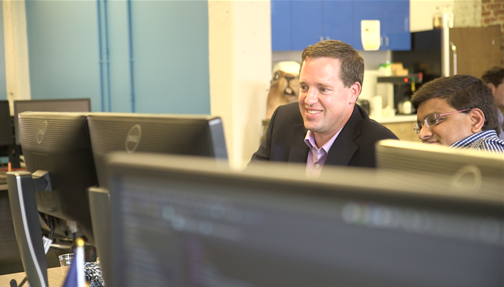Today’s tech companies are building some of the most sophisticated tools around, but their tech prowess doesn’t necessarily mean they can run their business without a little outside help from other technologies.
Software tools help tech employees communicate more efficiently and collaborate more completely. They help managers track performance and measure successes. Across the board, they help build a better business — and in doing so, they help build a stronger sense of culture, too.
We asked around town to learn more about the tools tech companies use on- and offline to build culture. Here’s what they had to say.
For DevMynd, Slack is a no-brainer. Not only does the company use it for their day-to-day communications with the team and clients, but DevMynd team members have also used the popular messaging tool outside of office hours to find each other at shows or coordinate activities like hiking excursions and bike rides.
"Slack helps our team engage with our customers quickly and efficiently since the majority of our clients are remote. It also helps us keep in touch with each other during our weekly work from home day," said CEO JC Grubbs.
Besides Slack, the team also reports using Google Hangouts for getting face time with remote clients and keeping the Chicago office engaged with remote workers working out of San Francisco. On top of that, the team likes to keep its social media skills sharp, using Snapchat to send goofy shots of each other during the day and teasingly sending Instagram posts during vacations to colleagues back at home.
DevMynd’s team can often be found playing games together and is particularly fond of Hanabi, a card game they play after hours. On Fridays, they have a cocktail hour, and they also have quarterly company outings.
“I think all of these tools promote the atmosphere that we have cultivated,” said New Client Consultant Chase Hires. “We work really well together, but we also regularly hang out together outside of work. These tools help us stay connected and promotes inclusion and camaraderie amongst our team.”
Where they lean on tech:
On any given day, the Strike team (headquartered in Chicago but with operations globally) employs a catalog of tech tools to make it through the day, ranging from Skype and Google Docs to Salesforce. In Strike’s case, even basic email is used to bolster culture. For every new deal closed, an email is automatically generated that alerts the whole team, which helps build a sense of collective success and a culture where everyone motivates one another to do his or her best.
Strike also takes advantage of its own SaaS product internally to help scale and grow without culture taking a hit. Utopsa enables teams to focus on performance and accountability, and while it doesn’t necessarily create new culture, the company said it definitely supports existing
core values.
“Good culture flourishes when people are happy and when the best people stay on the team. Technology supports our culture by freeing people to do their best work,” said Mark Shore, the company’s president and co-founder. “All the tools we use support quick, efficient communication and working in collaboration with others. We believe good tools should break down walls, not add them. We also found that technology supports culture because of how it makes people feel about their jobs. In our space, operations are mission-critical and can be high stress. Many companies report very high turnover within this area. But not at Strike. When our ad-ops people explained their pain points we built internal solutions that eliminated the most stressful, repetitious and tedious parts of their jobs. You can imagine the positive impact this kind of initiative has on company morale."
How they unplug:
Strike hosts events in and out of the office, including catered breakfasts on Fridays. Happy hours are far from unheard of, with larger nights out — things like Blackhawks games or Whirlyball trips — scattered in between.
In addition, Strike occasionally flies its team members between its international offices — giving workers the opportunity to taste new cultures and build communications between separate teams.

Where they lean on tech:
Picture this: you walk into a brand new office space on your first day of work, and it’s brimming with the high-tech equipment you need to thrive. You’ve got things like state-of-the-art video conferencing systems in the board rooms and tablets sitting outside each conference room for quick scheduling, with new developers and QA analysts getting high-powered MacBook Pros with 27 inch, 4K monitors.
That’s the scenario at GoHealth, a Chicago-based healthtech company focused on improving the insurance experience. In addition to shiny new hardware, GoHealth also uses tools like Bitbucket, Hipchat, JIRA, and Confluence to optimize communication and collaboration.
“GoHealth attracts top talent from across the country, and one of the best retention tools is providing our employees with top-notch technology,” said Shane Cruz, GoHealth’s CTO. “From high-tech conference rooms to adjustable standing desks to top-of-the line equipment, we want our employees to have everything they need to do their best work.”
How they unplug:
Employees at GoHealth also have adjustable desks with memory settings, workstations with sound-absorbing clouds that help minimize noise, and walls with auto-dimming glass that transform into whiteboards during impromptu brainstorming sessions.
On top of that, GoHealth utilizes some offline tools to help build a vibe that resonates with employees, including a flexible work from home policy, involvement in the local tech scene, and a quarterly recognition program that allows teammates to recognize and celebrate one another’s hard work.

Where they lean on tech:
From pulse surveys and polls to digital message boards, bswift — which builds software that helps simplify things like benefits and payroll — employs a host of different tech tools to keep its bswifters (that’s codeword for employees) happy, engaged, and informed.
Those tools include a pilot testing phase of Officevibe and a program that allows bswifters to anonymously text questions for executives to answer live during company meetings.
“As a tech company, we understand the value digital tools can bring to the table,” said CEO and President Kerry Sain. “Technology allows us to easily communicate and collect important feedback from our employees in real time.”
How they unplug:
Among other initiatives to build culture, bswift prides itself on its bYourself program, a network of resource groups for employees that facilitate networking, encourage collaboration and advance causes that are important to bswifters. Recent examples include the bYourself Women Leaders group, who recently hosted a panel on the challenges and benefits women face in the workplace, and the bYourself LGBT+ group, who organized a Pride flag signing which was framed and sent to Orlando first responders following the shooting at Pulse nightclub.

Where they lean on tech:
Across the board, Cision takes advantage of several tech tools in order to keep their team feeling connected and operating smoothly. Those tools include StoryBoard, a global recognition and performance management social platform that builds connections between employees and encourages them to recognize each other’s hard work. It’s a comprehensive approach that’s also designed as a personal hub to set, track, and celebrate goals and professional development milestones.
In addition, one of the company’s core values is to “Be Heard,” so Cision also uses pulse surveys in order to help amplify the voice of everyone on the team. In turn, management gains insight from the people on the ground in real-time.
But one of the largest tools they turn to is, fittingly, one of the largest tech companies around: Google.
“Whether it's fun gifs, video messages, or questions about contracts or projects, our employees take full advantage of the Google for Work suite to regularly interact and collaborate with colleagues across the globe,” said Sean Knudsen, an organizational development manager at Cision. “Our software engineering and technology teams in our Chicago headquarters have special Google Hangouts scrum rooms to help them share code, test new products, and build relationships with coworkers to help us build the best products we can.”
Images via featured companies/Shutterstock.









